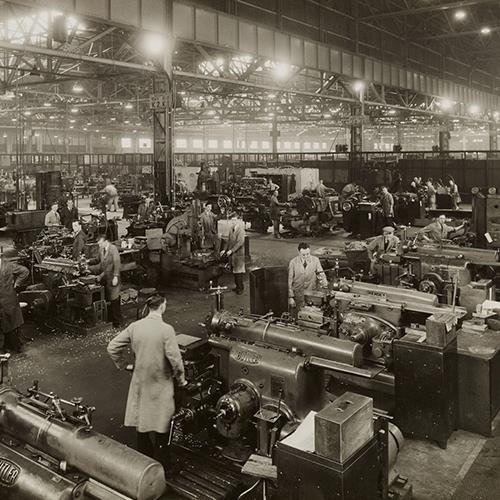Productivity lag: a high cost
Quebec's manufacturing sector lags significantly behind Ontario and world leaders such as the U.S. and Denmark in terms of productivity. Quebec manufacturers require 5.2% more working hours than those in Ontario to generate $1,000 of GDP, a gap that will narrow from 11% in 2019 to 5.2% in 2022. This gap can be explained in part by the predominance of small businesses and a lack of investment in advanced technologies. By comparison, to produce an equivalent amount of GDP, Quebec manufacturers use twice as much labor as their American counterparts. Denmark, with its high productivity, illustrates the importance of entrepreneurial dynamism, characterized by an abundance of innovative start-ups.
To close this gap, Quebec needs to focus on technology investment, encourage entrepreneurship, and restructure its industrial sector to favor larger, more competitive companies.
The impact of labor shortages
The productivity deficit in Quebec's manufacturing sector creates a vicious circle exacerbating the labor shortage. Because of their limited productivity, companies require more manpower to reach the same production levels as their more efficient competitors, such as those in Ontario. This increased demand for workers is coming up against an already tight labour market, exacerbating recruitment challenges. What's more, the lack of investment in automation and advanced technologies perpetuates dependence on an abundant, less-skilled workforce. This cycle increases companies' vulnerability to shortages, limiting their attraction of skilled talent and exacerbating their productivity deficit.
To break this vicious circle, an integrated strategy is required, combining :
- Adoption of innovative technologies
- Workforce training
This will reduce reliance on less skilled workers and improve the sector's overall efficiency.
Towards an environmental and technological transition
The environmental and technological transition is crucial to improving productivity in Quebec's manufacturing sector.
However, a survey carried out by Manufacturiers et Exportateurs du Québec (MEQ) reveals that a lack of qualified human resources, a lack of support or knowledge to implement new technologies, and a lack of leadership are the main obstacles to the adoption of advanced technologies.
Yet technologies such as automation and artificial intelligence enable companies to reduce their dependence on an abundant workforce, while increasing production efficiency. This technological modernization leads to better use of resources and reduced waste, bringing manufacturing practices into line with ESG imperatives.
Furthermore, investment in eco-responsible solutions, such as renewable energies and sustainable manufacturing processes, not only reduces ecological impact, but also improves energy and operational efficiency. This dual transition, both environmental and technological, offers Quebec manufacturing companies an opportunity to position themselves as competitive and responsible players on the world stage, while meeting the growing demands of sustainability and innovation.
Enhancing skills: a necessity
Improving skills is essential to boosting productivity in Quebec's manufacturing sector. Faced with rapidly evolving technologies and environmental requirements, workers need to be trained to master new technical and digital skills.
According to the Institut du Québec study, some 37% of manufacturing jobs in Quebec are concentrated in 15 occupations. By identifying areas of vulnerability in terms of educational attainment and labor demand for these occupations, targeted skills development strategies can be put in place.
This upskilling enables employees to better interact with advanced technologies, thereby increasing production efficiency and quality. Skills upgrading also contributes to making positions more attractive, helping to attract and retain quality talent, a key factor in combating labor shortages.
In conclusion
Faced with productivity challenges, labor shortages, and the demands of an increasingly sustainable economy, Quebec's manufacturing sector must embrace a profound transformation. This transformation requires the adoption of advanced technologies, a conscious environmental transition, and significant investment in skills development. By acting on these fronts, the sector can not only improve its productivity and competitiveness, but also position itself as a leader in the adoption of innovative and responsible manufacturing practices.
To find out more :Train the trainer: optimizing learning in an operational or manufacturing context









